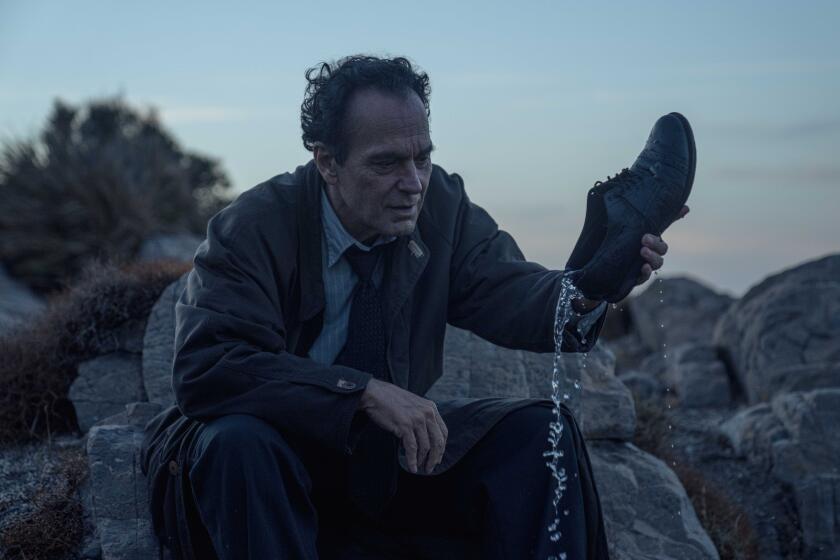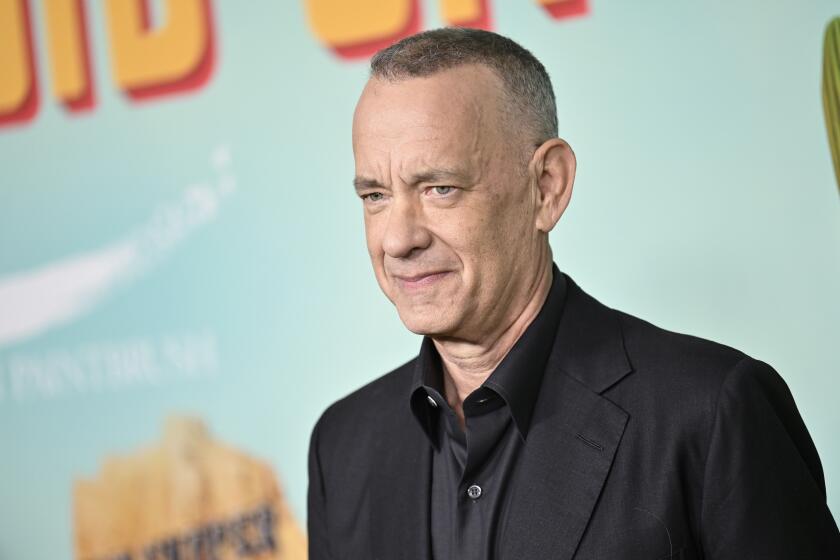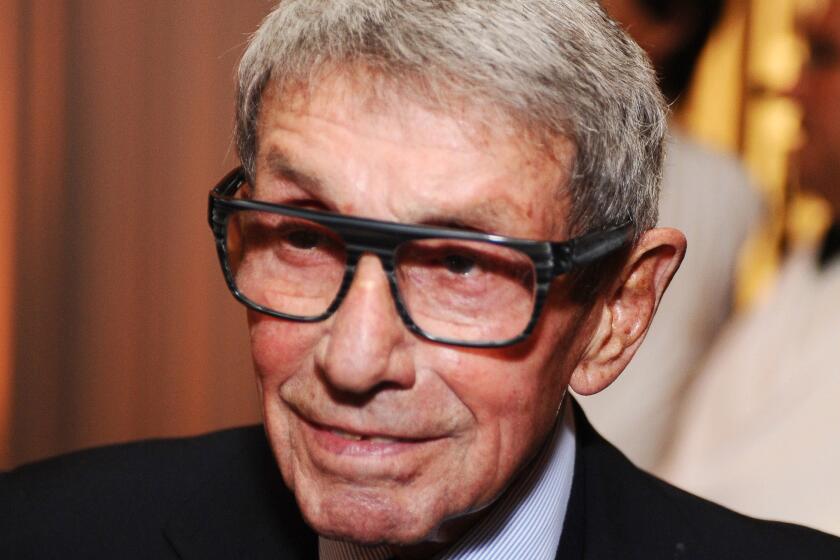A Hollywood Ending : Journeys: A film festival brought studio honcho Mike Medavoy and his parents back to Shanghai--and to memories of its golden era.
Mike Medavoy and his parents stand together on the deck of a cruise ship floating down the Huangpu River, using memories to re-create their old hometown. The majestic waterfront banks and hotels provide a familiar facade from the time when his parents--Michael and Dora Medavoy--and the city were in their prime.
But since Shanghai fell under Communist rule in 1949, neglect has chipped away at the once-dazzling metropolis, and a recent construction boom threatens to do even more harm. The river, though, is the same one that carried them away from Shanghai in 1947, a journey that took them from China to Chile and, ultimately, to Hollywood. Now, Hollywood has brought them back home.
Medavoy persuaded his parents to come along on his recent trip to attend a Shanghai film festival and plan a movie set here in what was once China’s most cosmopolitan city. It is not a movie based on his family’s life in Shanghai--but it could be.
This is the place, after all, where in its heyday, identities and fortunes could change in a night. Michael senior recalls how an heirless Chinese warlord tried to buy him from his mother. Dora tells of an Iraqi millionaire named Silas Hardoon who married a Chinese stocking mender he met on the street, then adopted a dozen children. They describe how wealthy gentlemen were ruined in casinos and opium dens and Russian refugees fleeing the Bolsheviks reinvented themselves as exiled royalty, or the unlucky ones as taxi dancers.
Michael and Dora Medavoy grew up in Shanghai, children of Russian emigres who fled the pogroms of World War I. They were among the thousands of foreigners who arrived to make their fortune in the booming Chinese port city--and the prime of their lives coincided with Shanghai’s golden age.
“I left behind a place that was very important to me,” says father Michael, a tall, thin 77-year-old with dark hair and a slight mustache. “It represents the best years of my life--my youth, my money. I almost didn’t want to come back because the memory was so good. But when I stepped off the plane I was crying.”
From the deck of the riverboat, Michael senior points to where foreign gunboats dropped anchor to protect their treaty port. Just up the river is the apartment where Mike, who was known before Hollywood as “Morris,” was born. And in front of Shanghai’s majestic embankment is the tree-lined promenade where Michael used to court Dora.
In a burst of gaiety between World Wars I and II, the Medavoys, like thousands of other expatriates, danced till dawn at the famous nightclubs--Ciro’s, Farren’s and the Paramount Ballroom. Dora owned a dress boutique, and her tailor made her a new gown every week for Saturday night on the town. “Shanghai was heaven for foreigners then,” Michael says.
The high life continued, though with a quietly growing desperation, as Japanese forces occupied the city in 1937. For the most part, foreigners were left alone. But in an attempt to smoke out Chinese snipers hiding on the rooftops, Japanese soldiers burned out the entire riverside section of town where Michael’s family lived.
Arriving on the same river were the victims of another war, boatloads of Jewish refugees fleeing Nazism in Europe. The Medavoys endured World War II, helping the new arrivals settle in Shanghai as others had helped their parents two decades before. But soon after the war was over, it became clear to Michael that though the Japanese army was gone, the Communist army of Mao Tse-tung would soon take their place.
“I knew they were coming, so we sold out and got out, just as my family did before from Russia. We sold all our furniture and my 1940 Plymouth, and got on a Norwegian steamer headed for South America,” Michael says. They chose to go to Chile, he says, because “the consulate had the shortest visa line in town.”
Mike Medavoy says that starting from scratch again gave him the perspective and toughness of an outsider who has had to win his way into the innermost circles, and gave his parents the sanguine calm of those who have not only survived but succeeded.
*
It wasn’t an easy journey for Mike, though the process of reinvention may have been the perfect training for Hollywood. “I too had to learn a new language, a new way of life. When I first got to America, I wasn’t an American. When I first got to Chile, I was a gringo,” he says, recalling his transition from mail-room clerk to studio head. “Knowing how to get beyond that has its advantages.”
The movie mogul was 7 when he left China and doesn’t remember much about it, except that he was teased for his red hair, preferred playing marbles to doing homework and loved the movies. The first movie he saw was in Shanghai, he says--a wartime Russian propaganda film about the Nazis.
“I remember the image of a woman jumping under a German tank, holding two hand grenades to blow it up,” he says. “For a 6-year-old, it was devastating.”
That theme of sacrifice and courage has haunted him throughout his career of making more than 300 movies with Columbia, TriStar and Orion Pictures. Now, in the first film by his newly created studio, Phoenix Pictures, it’s a theme he says he finally has the freedom to explore. (He is mum on the details of the film, saying it’s just in the preparatory stages with no title yet but it seems to be a story of a love triangle set against Shanghai’s changing history.)
Watching his parents rediscover Shanghai has sparked new insights for the picture, he says. “When I think about my parents, I really do think about courage,” he says. “They had to start over again three times. There are very few people who can do that and maintain their dignity. . . . I’ve learned a lot about them--from their reactions and their memories. And a lot about old Shanghai.”
*
His parents are busy learning about new Shanghai. Armed with copies of a 1937 map and one from 1995, the Medavoys make their way through Shanghai’s crowded streets, looking for their last apartment, Dora’s dress boutique and San Francisco Rosy, the concubine who once was their neighbor. Some of the places have given ground to construction sites, but they spot some familiar landmarks: the Ward Street prison and the Moshe Ohel synagogue built by Jewish refugees in 1927.
“I used to go there to pray,” Michael says. “The synagogue, of course, not the prison,” he adds with a smile.
They also find their old school, now the Shanghai Department of Education, the gate guarded sternly by an unsmiling official. Their driver tries to persuade him to let them in.
“These people just want to take a look at the school,” he says, gesturing to the anxious couple waiting in the car. “They grew up here.”
“Impossible,” says the guard, looking straight ahead, arms folded.
“They came all the way from America,” says the driver.
“No.” The guard shakes his head.
Michael Medavoy unfolds himself from the car, bows slightly to the guard and greets him in perfect Shanghainese. “I went to school here when I was this tall,” he says. “My wife went to school here. My son went to school here. We just want to take a look.”
The guard’s jaw drops. Michael, well-practiced in sweet-talking the authorities, continues.
“Look, I was born here. I’m Chinese,” he smiles. “You’re Chinese. Let us just take a quick look at where we went to school.” The guard puzzles a moment over whether this gentleman could really be Chinese. He glances away, then opens the gate.
Michael and Dora Medavoy gaze hard at the school, now a sterile-looking municipal office, and a synagogue shrouded in ivy and neglect nearby, trying to mesh the scene with the images long preserved in memory.
“There was a playground here, it was lovely,” Dora points out. “That building wasn’t there then and, of course, the synagogue was well-tended.” They dutifully snap pictures of each other, somewhat blank-faced, in front of the ministry and the sagging synagogue.
Hollywood brought them back, but the ending to their journey is quintessentially Chinese. Suddenly tired, they step back into the car.
“We had a wonderful life here,” says Michael, bowing his head. “But everything has changed. Everything has changed.”
More to Read
Only good movies
Get the Indie Focus newsletter, Mark Olsen's weekly guide to the world of cinema.
You may occasionally receive promotional content from the Los Angeles Times.






